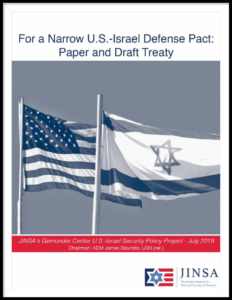Conference Call on U.S.-Israel Defense Pact with Senator Graham
Discussing newly released JINSA Gemunder Center Paper and Draft Treaty
“For a Narrow U.S.-Israel Defense Pact”
Featuring:
Senator Lindsey Graham
Michael Makovsky, PhD, JINSA President & CEO
Jonathan Ruhe, JINSA Director of Foreign Policy
 |
 |
 |
July 30, 2019
Paper Overview
The U.S.-Israel Security Policy Project at the Jewish Institute for National Security of America (JINSA) released a May 2018 report recommending policies to bolster the U.S.-Israel security relationship to meet the growing Iranian threat. This included consideration of a bilateral U.S.-Israel mutual defense treaty similar to, but more narrowly defined than, existing U.S. arrangements with 50 countries on five continents.
Recent press reports that the U.S. and Israeli governments are discussing a bilateral defense pact have prompted the release of this separate brief paper addressing the topic, and describing what sort of pact would be in the best interests of both countries. This paper includes draft text of such a treaty to serve as a basis for domestic and bilateral discussion.
The primary purpose of a U.S.-Israel mutual defense pact is to add an extra layer of deterrence to Israel’s strategic position, and to America’s position in the Middle East, and ultimately a last line of defense. The U.S.-Israel Policy Project arrived at a set of principles and provisions for a narrow formal treaty alliance which, unlike existing U.S. defense treaties stating unequivocally that an attack on one is an attack on all, would cover only a defined set of exceptional circumstances that would place either country in extreme peril. Namely: the threat or use of weapons of mass destruction; major armed attack by a powerful regional or global power, or coalition of powers; an assault threatening vital lines of air and sea communication; an attack undermining Israel’s qualitative military edge; or an urgent request from either government.
While balancing each country’s concerns about freedom of action and overextension, and committing no American troops to Israel, a narrowly defined mutual defense pact would advance U.S. interests and help prevent an extraordinary conflict that could threaten Israel’s strategic and economic vitality and viability.
